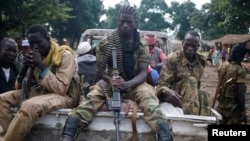Seleka rebels in Central African Republic blocked two main roads through Bangui on Thursday and exchanged gunfire with U.N. peacekeepers brought in to calm inter-religious violence, witnesses said.
The fighters, based at a military camp in the capital since their leader ceded power to a transitional government in January, were protesting against a plan to relocate some of their ranks out of Bangui to improve security.
The rebel movement has rejected the plan, to be carried out by the International Organization for Migration, citing safety concerns.
"The prime minister has just received our delegates to negotiate, so the government has taken into account our demands," Lieutenant Dieu Beni Detemale, the Seleka commander at the camp, told Reuters. "If there is a positive outcome, we will remove the roadblocks."
It was not clear whether anyone was hurt in Thursday's gunfire. Witnesses said both sides appeared to shoot into the air.
Central African Republic sank into chaos when the mainly Muslim Seleka seized power in the majority Christian state in March 2013, ousting President Francois Bozize.
A backlash from the mostly Christian or animist "anti-balaka" militia led to violence that has killed thousands and displaced around 1 million people.
Under international pressure, Seleka leader Michel Djotodia stepped down as president, paving the way for a transitional government.
Despite the presence of the peacekeeping mission — the U.N. Multidimensional Integrated Stabilization Mission in the Central African Republic, or MINUSCA — the violence has continued.
"This violence could lead to the loss of lives among the civilian population and endanger efforts to stabilize the country,'' the mission said in a statement.
International mediators meeting in Bangui this week admitted that an initial February 2015 date fixed for fresh elections was no longer feasible and called for the transitional period to be extended by six months.
"The transition process must be accelerated in order to hold elections in June or July 2015," said Basile Ikouebe, foreign minister of the Republic of Congo, who represented his president and lead international mediator Denis Sassou Nguesso.
Central African Republic is rich in diamonds, uranium and gold, but it has been plagued by coups and incompetent government since gaining independence from France in 1960, leaving it one of the world's most impoverished countries.









